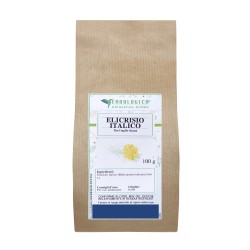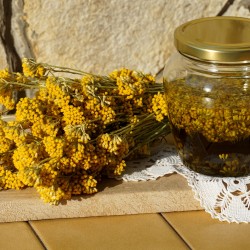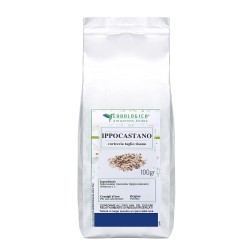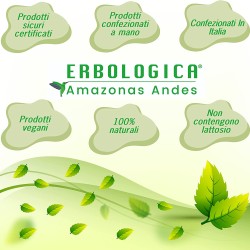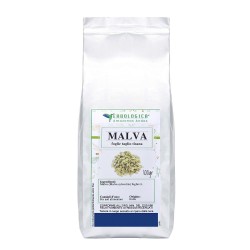
Le emorroidi sono una condizione piuttosto comune, caratterizzata da gonfiore e infiammazione delle vene del retto e dell'ano. Questa problematica può essere causata da diversi fattori, tra cui stitichezza, gravidanza, obesità o uno stile di vita sedentario, e si manifesta con sintomi come dolore, prurito e sanguinamento. Per fortuna, la natura ci offre validi rimedi per alleviare questi fastidi in modo delicato ed efficace. Tra i migliori rimedi naturali spiccano le tisane a base di elicriso, centella e malva, piante officinali note per le loro proprietà curative.
Elicriso: L’Antinfiammatorio Naturale
L’elicriso (Helichrysum italicum) è una pianta dalle straordinarie proprietà antinfiammatorie e decongestionanti. Grazie ai suoi principi attivi, aiuta a ridurre il gonfiore e il dolore, migliorando la circolazione e favorendo la guarigione delle emorroidi. I fiori di elicriso vengono utilizzati per preparare tisane che, se consumate regolarmente, possono offrire un sollievo naturale ai sintomi.
Per preparare una tisana di elicriso, aggiungi un cucchiaio di fiori essiccati a una tazza di acqua bollente, lascia in infusione per 10-15 minuti, filtra e bevi. Si consiglia di consumarne due tazze al giorno per ottenere risultati ottimali. Sul nostro shop puoi trovare i fiori di Elicriso di alta qualità.
Centella: La Pianta che Rafforza le Vene
La centella asiatica (Centella asiatica) è conosciuta per le sue proprietà benefiche sul sistema venoso. Questa pianta, utilizzata da secoli nella medicina tradizionale, è ideale per chi soffre di emorroidi, poiché migliora la circolazione sanguigna, rafforza le pareti venose e riduce l’infiammazione.
Preparare una tisana di centella è molto semplice: basta infondere un cucchiaio di foglie essiccate in una tazza di acqua bollente per circa 10 minuti, filtrare e bere una o due volte al giorno. Grazie alla sua azione specifica sulle vene, la centella è una scelta eccellente per alleviare i sintomi delle emorroidi e prevenirne il peggioramento. Scopri di più sulla centella asiatica sul nostro sito.
Malva: L’Emolliente Perfetto
La malva (Malva sylvestris) è un rimedio naturale particolarmente indicato per alleviare il dolore e l'irritazione causati dalle emorroidi. Ricca di mucillagini, la malva ha proprietà emollienti e lenitive che proteggono le mucose e facilitano l'evacuazione, riducendo al contempo il rischio di ulteriori infiammazioni.
Per preparare una tisana, utilizza un cucchiaio di fiori e foglie essiccate di malva, lascia in infusione in una tazza di acqua bollente per 10-15 minuti, filtra e consuma due o tre volte al giorno. Per chi cerca una soluzione naturale, la malva rappresenta una scelta sicura ed efficace. Puoi acquistare la malva taglio tisana direttamente sul nostro sito.
Come Integrare le Tisane nella Routine Quotidiana
Integrare le tisane di elicriso, centella e malva nella propria routine quotidiana è un passo semplice ma efficace per alleviare i sintomi delle emorroidi. Queste tisane possono essere consumate singolarmente oppure combinate per sfruttare le loro proprietà sinergiche. È importante scegliere erbe essiccate di qualità, preferibilmente biologiche, per garantire la massima efficacia.
L’uso delle tisane dovrebbe essere accompagnato da uno stile di vita sano. Adottare una dieta ricca di fibre, bere molta acqua e praticare regolarmente attività fisica sono abitudini fondamentali per prevenire e gestire le emorroidi.
Avvertenze e Consigli
Anche se le tisane a base di elicriso, centella e malva sono generalmente sicure, è sempre consigliabile consultare un medico o un erborista qualificato prima di iniziarne l’assunzione, soprattutto in caso di allergie, gravidanza o assunzione di farmaci. Se i sintomi persistono o peggiorano, è fondamentale rivolgersi a uno specialista per una diagnosi accurata e un trattamento adeguato.
Per scoprire di più sulle proprietà di queste erbe e acquistare i prodotti, visita il nostro Erbologica.


